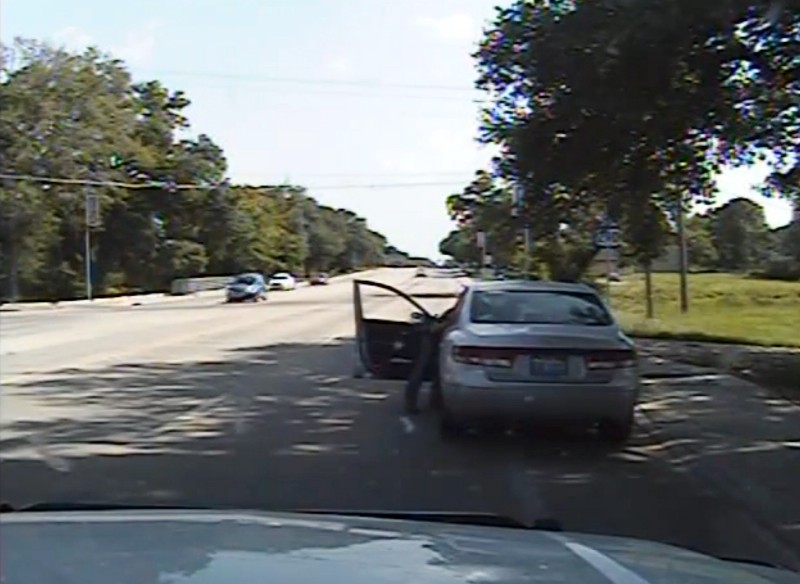
Tulsa Police officer Betty Shelby, right, being escorted into court for an early proceeding in her upcoming manslaughter trial in the killing of Terence Crutcher. CREDIT: AP Photo/Sue Ogrocki, File.
The visual evidence of Terence Crutcher’s murder by Officer Betty Shelby was so clear, and so overwhelming, there was no choice when it came to prosecuting her. The sheer obviousness of her guilt has led her lawyers to trying out something new. It’s a twinkie defense, that’s clear, but we should all remember that juries will buy a twinkie defense, especially if they want to, which will most likely happen in this case.
…It will probably be a long time before Shelby sees the inside of a courtroom. But her lawyers are already previewing her case in the media — and Shelby’s attorneys have a strange argument they’ll use in her defense.
Shelby had no idea her backup was right behind her, prepared to subdue Crutcher with a less-lethal taser, the lawyers are saying, because she was temporarily deaf due to the stress of the situation. The law enforcement community calls it “auditory exclusion.”
“She didn’t hear the gunshot, didn’t hear the sirens coming up behind her just prior to the shot,” defense lawyer Scott Wood told the Associated Press last week. Auditory exclusion is “the no. 1 perceptual distortion by people I have represented who have been involved in shootings,” he added.
Wood’s scientific-sounding argument will make Betty Shelby’s ears a strange new battlefield in the struggle to reform American law enforcement. If her lawyers manage to present “auditory exclusion” as hard science, her trial will mark a step toward allowing the use of a cloud of medical-sounding jargon to obscure the implicit racial biases that cops carry to explain a killing that has all the hallmarks of the epidemic of biased policing of black people.
Is “Auditory Exclusion” Science or Subjectivity?
Professor Philip Stinson, a former cop and criminal lawyer who now teaches at Bowling Green State University, maintains the most comprehensive database anywhere on police officer prosecutions for killing civilians. Out of 77 officers charged with murder or manslaughter for killing a civilian since the start of 2005, he said, none appears to have argued in court that “auditory exclusion” excused their actions.
“From my standpoint, it’s completely nuts,” Stinson told ThinkProgress. “I don’t see this being admissible at all.”
But researchers diverge on whether people can go temporarily deaf under duress.
Those ThinkProgress reached who study the brain’s physiology said they know of no research supporting it. “Stress does all sorts of things to sensory systems,” wrote Stanford neurologist Dr. Robert Sapolsky, “but the idea of deafening is ludicrous.” Dr. Andrew Steptoe at University College London, who studies “peritraumatic dissociation” during episodes of intense fear or stress, said the idea is plausible “but I know of no solid evidence for this.”
But approached from a psychologist’s perspective, the theory is better grounded. Penn State Behrend associate professor Melanie Hetzel-Riggin said it helps to imagine the difference between hardware and software here.
“On the hardware side, they’re right, there’s probably no physiological problem in that your hearing itself is fine. What’s happening is the info isn’t going anywhere,” she said. “It is possible, although I’m unaware of any research supporting this one way or the other, that during that experience of threat your hearing could be focusing on that and not anything else going on around you.”
[…]
Police training materials are commonly designed to neutralize the panic psychology that Shelby’s lawyers hope will exonerate her. Simulations like the “force option simulator” at San Diego Regional Law Enforcement Training Center are in widespreaduse.
With public pressure for reform mounting over the past couple years, police departments have invited reporters to try their hand at the simulators as part of a PR offensive.
The reporter sessions illustrate how your average geek off the street would struggle with the stresses of the job, to be sure. But the point of the training is to ensure cops are better than us at this stuff. The people whom society entrusts with deadly force and unique authority are supposed to know how to avoid such dangerous responses to something that overloads our brain’s fight-flight instincts. Police academies traditionally give 13 times as much attention to training officers to handle violent situations professionally as to deescalation practices.
“The good thing about police officers and other people who are emergency responders is they have all this training to make it muscle memory, to make it automatic,” said Hetzel-Riggin.
“There are many situations that are going to be perceived as less threatening, because police officers have the training, the practice.”
With all that training, there’s only one thing left – implicit bias. And all too often, when it comes to cops, explicit bias. It’s a problem everyone is tip-toeing around, and it’s the one problem which desperately needs to be addressed. Way more than enough people have been murdered by cops.

















